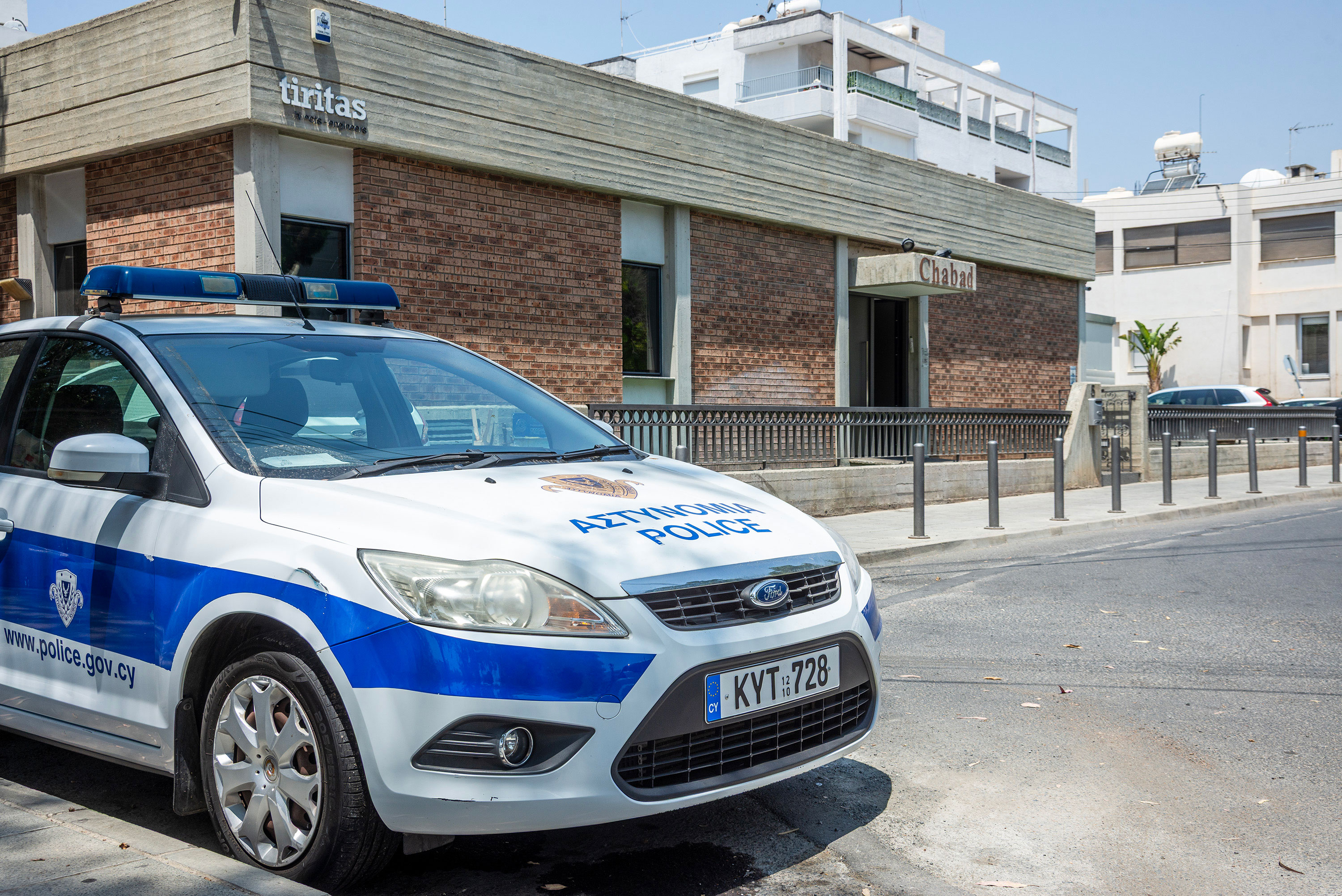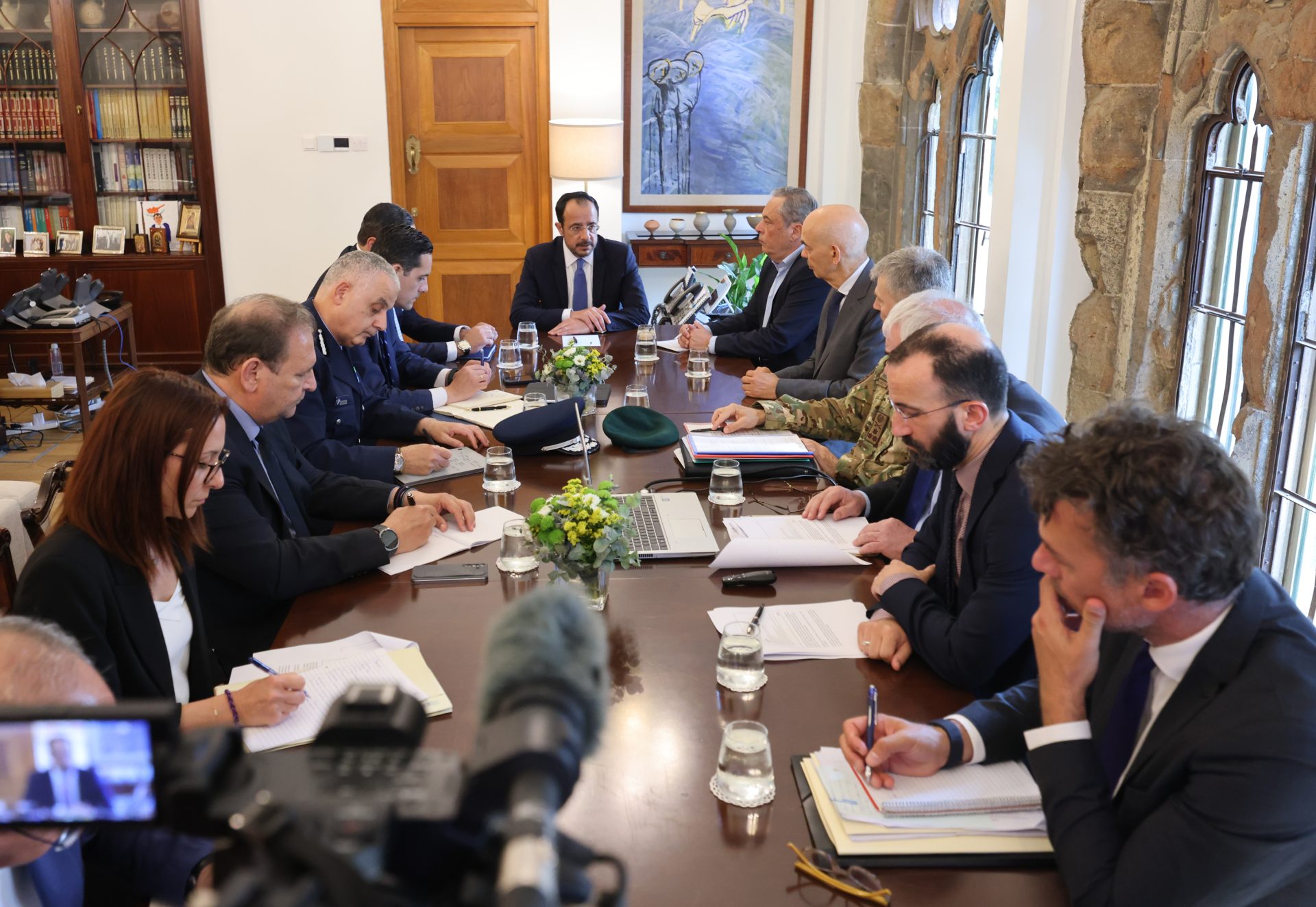Estia plan activated, police on alert
President Nikos Christodoulides on Friday said he hoped there would be no further escalation in the region in the wake of Israel’s air strikes on Iran in the early hours of Friday, distancing Cyprus from the conflict.
Security was the highest priority, he said.
Christodoulides was speaking at the start of an extraordinary national security council meeting called to discuss the implications on the wider region including Cyprus in terms of national security and the island’s humanitarian role through the Estia national plan to facilitate evacuees.
Cyprus “is not involved in any way and its role, as always, is stabilising and humanitarian,” Christodoulides said. “We are at the disposal of any country that wishes to evacuate its nationals from the region”. So far there had not been any state requests to evacuate third-country national but some countries had reached out.
He said he and his advisors that include minsters, police and army chiefs from both the National Guard and the Greek forces on the island had three issues on the table – assessing the state of affairs in conjunction with partners in the EU and the US, humanitarian assistance, and security on the ground.
He was being briefed, he said on security issues especially at ports, airports, the Paphos air base, and in relation to Israeli and other foreign interests on the island to decide if the National Guard needed to be deployed. “The issue of security is the highest priority for all of us.”
“Our position is clear. We hope that there will be no further escalation. Escalation does not help in any situation whatsoever,” the president said.
“We also have Cypriots who are in Israel and Iran. Efforts are being made that can be made within the framework of this difficult and chaotic situation,” he added.
This was also being discussed.
Following the two-hour meeting, Government Spokesman Konstantinos Letymbiotis told reporters the assessment the president spoke about had been carried out.
“We are sending a message. We are in contact with all our international partners to de-escalate the crisis in our region. Our stabilising role will increase as much as we can, within the framework of our capabilities,” he said.
The foreign minister, he added, had already had telephone conversations with both his Iranian and Israeli counterparts and with a number of leaders of the states in the region, with Lebanon, Iraq, Jordan, Bahrain, Egypt, Oman, Palestine, the United Kingdom, and with the EU. The president had spoken directly with the Greek Prime Minister.
“What is paramount at these times is regional security and as a member state of the European Union, as the closest member state to the region, we will assist and contribute in every possible way to the efforts to de-escalate the crisis,” said Letymbiotis.
As for domestic security, he said there were specific plans that were activated. People should not panic unnecessarily, he said.
The National Security Council would be in continuous communication in the coming days, he added.
“Every moment is critical, as the developments are… you see that the developments that are evolving, are rapid.”
“De-escalation is for the benefit of the entire region.”
The spokesman said the coming hours were critical.
“Every moment that passes and the crisis does not escalate is positive.”
Earlier on Friday, Foreign Minister Konstantinos Kombos in a post on X urged all parties in the conflict to show maximum restraint.
Referring to Cyprus’ “deep concern” about developments in the region, he said: “We condemn all military actions in the Middle East as a threat to peace and security.”
“I urge all parties to show maximum restraint. Escalation is not in anyone’s interest. Negotiations and diplomacy are the only way”.
On Friday morning, Cyprus immediately activated the Special National Plan ‘Estia’ for the reception and repatriation of foreign citizens through Cyprus.
An inter-ministerial meeting was held at the foreign ministry in Nicosia, following activation of the plan.
Participants in the meeting include the ministers of foreign affairs, interior, defence, public order, and transport.
Additionally, the deputy ministers of tourism and migration, the chief of police, and national guard, and the government spokesman also participated.
Estia is activated in case of emergency or crisis, to allow for the safe evacuation of civilians from a nearby crisis area through Cyprus.
A statement from the foreign ministry after the meeting said the ministers had examined the procedures for its implementation.
“In addition, a review was made of the situation regarding the closure of airspace in our region by various states and the diversion of air flights to Cyprus,” the statement said.
In total, 2,427 passengers from 29 diverted flights were disembarked in Cyprus, 979 at Larnaca and 1,448 at Paphos.

Cyprus police said they had taken precautionary measures to strengthen security at airports and ports, as well as in other places where Israeli citizens gather.
A spokesman told the Cyprus News Agency that strict measures were already in place in the above areas. However, following the strikes on Iran, security measures were strengthened, including at the Israeli embassy.
A statement on the embassy’s website said that in light of the developments, Israeli missions around the world would be closed and consular services would not be provided. It advised its citizens to make use of the website’s online facilities.
According to reports, all police on active security duty were told to wear bullet-proof vests.
Since dawn, armed police officers were stationed at the synagogue in Larnaca, along with a private security in the area.
Patrols were also been deployed at Jewish-owned companies in Cyprus.
Students attending Jewish schools in Limassol did not go to class on Friday. Parents were informed early. There is a Jewish kindergarten and an elementary school in Limassol.
Two scheduled cultural events that were to take place over the weekend have also been cancelled.
As for the wider impact on Cyprus, the head of the Research Service of the National Institute of Nuclear Weapons, Charalambos Chrysostomou told CNA the island’s proximity to the conflict would result in both economic and social impacts, starting with an increase in the price of oil, which will have knock-on effects.
Also, he said, there was a likelihood of increased movement of Israelis to Cyprus. Many Israelis have already descended on Cyprus due to the Gaza situation.
“It is possible that the tension and insecurity that exists among the Israeli population and the ongoing war situation that exists, may lead other Israelis to want to come, either permanently or temporarily,” Chrysostomou said.
He stressed that Friday morning’s strikes by Israel on Iran were “unprecedented”, compared with previous occasions.
“Previous strikes were controlled, for prestige purposes and had not hit nuclear infrastructure. Now we are moving to a substantive strike with a different goal, rather than a symbolic one,” he concluded.






Click here to change your cookie preferences